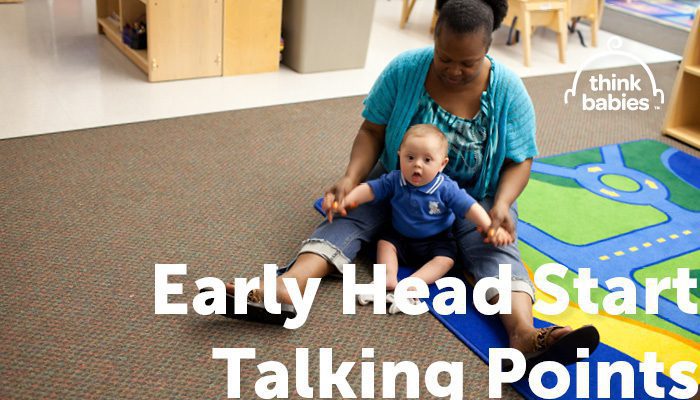Use these talking points to urge your policymakers and other stakeholders to Think Babies by sharing more information about Early Head Start and how it supports infants and toddlers experiencing poverty.
IN THIS RESOURCE
- Think Babies Top 5 Early Head Start Talking Points
- America’s Future Depends on Early Head Start
- Poverty Affects Children’s Brain Development and Learning
- Early Head Start Approach
- Research Demonstrates that Early Head Start Shows Success for Children and Families
- Early Head Start Supports Community Development
- Early Head Start Was a Critical Support During COVID-19
- Policy Recommendations
It is Time to Think Babies™
- The science is clear. Our brains grow faster between the ages of 0 and 3 than at any later period in life, forming more than one million new neural connections every second.
- When babies have nurturing relationships, positive early learning experiences, and good health and nutrition, those neural connections are stimulated and strengthened, laying a strong foundation for the rest of their lives.
- When babies don’t get what their growing brains need to thrive, they don’t develop as they should. This leads to life-long developmental, educational, social, and health challenges.
Think Babies Top 5 Early Head Start Talking Points
1. Nearly 1 in 5 infants and toddlers lives in poverty. Black and Latinx children are far more likely to live in poverty than non-Hispanic white children.
2. Poverty undermines brain development in key regions impacting school readiness and academic success.
3. Early Head Start is an evidence-based and community-driven program that supports the healthy development of babies, toddlers, and pregnant people living in poverty to ensure that all children have the same opportunities to succeed.
4. Early Head Start only reaches 7% of eligible infants and toddlers.
5. In a rigorous study, Early Head Start showed positive impacts across a broad set of factors, including boosting babies’ learning, language, health, and behavior.
America’s Future Depends on Early Head Start
- Of the 12 million infants and toddlers across the United States, nearly 1 in 5 lives in poverty, but poverty is not equitably distributed. More than a fourth (28%) of Black children and more than a fifth (22%) of Hispanic children live in poverty, compared to 9% of non-Hispanic White children living in poverty.
- That means that far too many families face persistent hardships – such as food insecurity, unstable housing, unsafe neighborhoods, and exposure to violence – that create unrelenting stress that impacts a family’s ability to provide the nurturing experiences babies need to thrive.
- Early Head Start is the only federal program specifically focused on the early development and learning experiences of babies and toddlers living in families with incomes below the poverty line.
- Currently, Early Head Start only reaches 7% of eligible infants and toddlers.
Poverty Affects Children’s Brain Development and Learning
- Children who start out in poverty are more likely to fall behind in self-regulation, learning, memory, and language and emotional control. Gaps in development appear before a child’s second birthday.
- Young children living in poverty are more likely to experience learning disabilities or developmental delays.
- Because this is such a formative time for children, every second a baby and toddler lives in poverty is another second his or her brain development and future success is threatened.
Early Head Start Approach
- Early Head Start is an evidence-based and community-driven program that supports the healthy development of babies, toddlers, and pregnant women living in poverty to ensure that all children have the same opportunities to succeed.
- Infants and toddlers whose families have incomes below the Federal Poverty Guidelines are eligible for Early Head Start. Children under the age of three in foster care or experiencing homelessness are also automatically eligible.
- As a two-generation program, Early Head Start creates opportunities for both parents and very young children, helping parents improve their prospects for economic security while simultaneously ensuring their children are on a solid path from the earliest age to engage in lifelong learning.
- Early Head Start programs:
- Provide child development services through early childhood education settings (high-quality centers or family child care homes meeting Early Head Start requirements) or weekly home visits with program staff. Local agencies determine the program options that will best serve eligible children and families in their communities.
- Partner with parents to, supporting them in parenting and shaping their children’s development.
- Address the multiple risks of poverty through a full range of individualized services for young children and their families, including child development, health and mental health, nutrition, and family support services.
- Conduct annual community assessments to ensure the programs offer the most meaningful program options to address local family needs, identify resources and gaps in services, and reach the families that are most in need.
- Early Head Start programs must follow national standards for high-quality and comprehensive services.
Research Demonstrates that Early Head Start Shows Success for Children and Families
- Early Head Start received a rigorous longitudinal, large-scale, randomized-control trial study. Researchers found that the program makes a positive difference across a broad set of factors associated with children’s success in school, family self-sufficiency, and parental support of child development.
- Early Head Start benefits children and their families. Enrolling early is best, for both pregnant mothers and their children.
- Children in Early Head Start showed positive impacts at ages 2 and 3, including enhanced cognitive and language skills, decreased aggressive behaviors, increased engagement with parent during play, and increased rates of immunization.
- Parents offer more stimulating home environments, read more with their children, use less physical punishment, and have higher levels of self-sufficiency.
- Early Head Start mothers who enrolled during pregnancy made more gains in emotionally supporting their children, and their children demonstrated stronger impacts on their social-emotional and cognitive development at age three.
- Continuous services yield the best results. At age five, children who had Early Head Start followed by a formal preschool program at age four to five, such as Head Start, had the best outcomes. Families with multiple risk factors appear to particularly benefit from five continuous years of comprehensive services.
- Particularly strong and lasting impacts were found for African American children, including through fifth grade.
- For children who had attended center-based Early Head Start programs, at fifth grade, grade retention was cut by more than half compared with the control group.
- Investing in Early Head Start has unexpected welfare benefits. Research found that participation in Early Head Start led to a long-term reduction in children’s involvement with the child welfare system.
Early Head Start Supports Community Development
- Early Head Start takes an active role in community leadership in early childhood education and family support. They regularly convene stakeholders to assess community needs and plan and innovate response.
- Early Head Start supports child care and family child care partners in meeting high standards for care and comprehensive support, raising the quality of care and services for all children enrolled in those community programs.
Early Head Start Was a Critical Support During COVID-19
- Because Early Head Start is structured to provide comprehensive services flexible to the needs of a community, programs remained on the frontlines serving babies and families during the COVID crisis.
- Even while facilities closed, programs continued outreach to families by delivering essentials such as diapers, formula, wipes, and meals, and continuing classes online.
- As the economic and social aftermath of the pandemic affects communities, Early Head Start is particularly well-suited to address the evolving needs of infants, toddlers and their families. In its two-generation focus, programs are poised to offer babies safe care and crucial developmental services; support families in finding work and dealing with the losses and stresses of the pandemic and its aftermath; and work at the community level to address local needs for young children and their families most vulnerable to the pandemic’s long term impacts.
Policy Recommendations
- To meet the myriad needs of families and allow Early Head Start and Head Start to continue serving as stabilizing forces in communities in the wake of COVID, Congress should provide $11.2 billion in additional relief funding for the Head Start system.
- Policymakers should increase federal and state investments in Early Head Start, and programs modeled on Early Head Start, to ensure that more eligible infants and toddlers are served.
- Congress should continue directing federal funding to expand Early Head Start capacity.
- The U.S. Department of Health and Human Services should encourage programs to convert funded Head Start slots to Early Head Start openings wherever doing so meets community needs.
- State policymakers should direct state resources to fund comprehensive services for infants and toddlers who are most in need by expanding Early Head Start.
- Policymakers should continue to anchor Early Head Start in adequately resourced community assessments and informed local choices for the program options most needed in communities.
- Ensure that Early Head Start programs are supported in offering the high-quality services through the program options that make sense for their community.
- Continue the option for local programs to partner with child care centers and provide extra training and technical assistance resources.
- Policymakers should support efforts to grow a well-qualified and fairly compensated Early Head Start workforce, prepared to serve the youngest children and families.
- Policymakers should emphasize enrolling pregnant women in Early Head Start to maximize the time they and their children can benefit.
- Finally, policymakers should fund new research to assess how programs that are implementing new Head Start Program Performance Standards benefit families and children.





